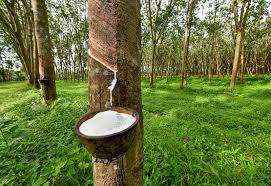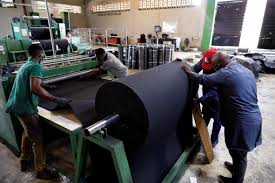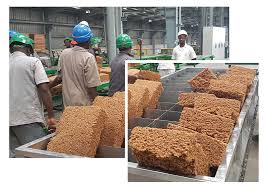![]()
If you’ve landed on this article page, you’re probably searching for a
good business idea—an idea that’s light on the pocket but heavy on
returns, promising both a fulfilling journey and potential profit.
|
How To Start A Lucrative Natural Rubber Farming Business In
Nigeria
Rubber farming, also known as Hevea brasiliensis cultivation,
involves the planting, care, and harvesting of rubber trees for
the production of natural rubber. It is an important
agricultural practice in Nigeria and Africa, contributing
significantly to the economies of several countries in the
region.
The sap is called “latex” and they are collected by making a
long cut through the bark. This latex is a white liquid. The sap
runs down the cut and is collected in a pot strapped to the tree
trunk, they are then dried and run between rollers to form
Rubber sheets.
Nigeria is among the largest producers of natural rubber in
Africa, with a production capacity of over 145,000 metric tonnes
in 2020. The country has vast rubber plantations in states such
as Edo, Delta, Ondo, and Ogun. These plantations cover thousands
of hectares, providing a source of income for thousands of
farmers and laborers. The rubber farming industry in Nigeria and
Africa also provides employment opportunities, with over 300,000
people employed in the sector.
After planting and caring for the rubber trees for several
years, farmers can start to tap the trees for latex production.
The yield from rubber farming varies depending on several
factors, including the age and variety of the trees, the
climate, and the management practices employed. On average, a
mature rubber tree can produce between 400 and 500 grams of
latex per tapping, with up to 200 tappings per year.
Rubber farming in Nigeria and Africa presents several business
opportunities beyond just the cultivation and harvesting of
rubber latex. Here are 15 potential business opportunities that
can be explored:
Rubber processing factories: Establishing processing factories
to convert raw rubber latex into finished products such as
tires, rubber mats, and other rubber products.
Rubber trading: Purchasing rubber latex from smallholder farmers
and selling them to processing factories or other buyers.
Rubber seedlings production: Growing rubber seedlings for sale
to new rubber farmers.
Rubber plantation management: Offering services such as land
preparation, planting, maintenance, and harvesting of rubber
plantations.
Rubber research and development: Conducting research on rubber
farming practices, seed varieties, and new technologies.
Rubber farming training and consultancy: Providing training and
consultancy services to new rubber farmers.
Rubber latex testing services: Offering testing services to
ensure the quality of rubber latex before it is sold.
Rubber logistics and transportation: Providing transportation
services to move rubber latex from farms to processing
factories.
Rubber packaging: Producing and selling packaging materials such
as sacks and bags used to store and transport rubber latex.
Rubber marketing and sales: Providing marketing and sales
services for rubber products.
Rubber equipment manufacturing: Producing and selling rubber
farming equipment such as tapping knives and buckets.
Rubber waste management: Providing waste management services for
rubber processing factories.
Rubber financial services: Offering financial services such as
loans and insurance to rubber farmers.
Rubber by-product utilization: Exploring and exploiting
potential by-products of rubber such as biomass and carbon
black.
Rubber exportation: Exporting raw rubber latex or finished
rubber products to international markets.
These business opportunities can be explored by entrepreneurs
looking to diversify and grow their businesses in the rubber
farming industry.
Starting a rubber farming business in Nigeria and Africa can be
a lucrative venture if done correctly. Here is a step-by-step
guide on how to start:
Conduct Research: Start by researching the types of rubber that
grow well in your location, the market demand, and the necessary
equipment needed.
Land Acquisition: Obtain land that is suitable for rubber
farming, ideally in a location with adequate rainfall and good
drainage.
Planting: Prepare the land by clearing bushes and trees, and
planting rubber seeds or seedlings in rows. Ensure that the soil
is properly fertilized and drained.
Care and Maintenance: Regularly weed and prune the trees to
ensure optimal growth. Apply fertilizers and insecticides as
needed.
Harvesting: Rubber trees take about 6-7 years to mature before
they can be tapped for latex. The trees should be tapped once a
day, and the collected latex should be transported for
processing.
Processing: Process the harvested latex into rubber sheets using
appropriate equipment, such as coagulation tanks, washing
machines, and sheeting machines.
Packaging: Package the rubber sheets for sale to buyers, or
manufacture rubber products such as tires or gloves.
Marketing: Identify potential buyers for your rubber products
and market your products through advertising and promotions.
It is essential to note that rubber trees do not begin to
produce latex until they are about 7 years old, and they can
continue to produce for up to 30 years. As such, farmers need to
have a long-term perspective when investing in rubber farming.
They should plan their planting and harvest season accordingly
and be prepared to wait for a few years before seeing
significant returns on their investment. With proper management
and care, rubber farming can be a lucrative venture for farmers
in Nigeria
Each of these types of rubber farming businesses requires
different skills and resources. Small-scale farming, for
example, requires minimal investment and can be managed by
individual farmers, while large-scale farming requires
significant investment and management skills. Rubber processing,
on the other hand, requires specialized equipment and knowledge
of rubber processing techniques. Each type of rubber farming
business has its own unique challenges and opportunities, and
entrepreneurs should carefully consider their options before
starting a business in the rubber industry.
Get our training guide, this guide reveals key insights on profitability in setting up your own Natural Rubber Farming Business you will learn the best way to market and profit from the business. Most especially, you will learn the exact costs of the materials and equipment you need for your Natural Rubber Farming Business. The body of this work is formed from consulting experienced and relevant people running the business to get first-hand information about the success secrets and marketing strategies deployed to achieve business success.
|







